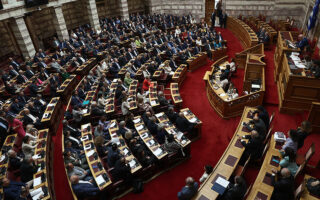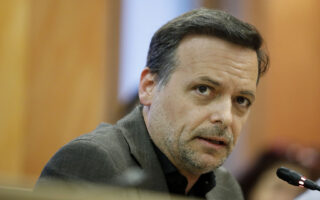Why Greece is not France
Many have envied the French (center-)left alliance. Can this experiment be replicated here?

On the evening of July 7, a deep sigh of relief from Athens accompanied the lively celebrations on the streets of France. The proponents of the idea of creating a grand coalition of the progressive zone that would be able to compete on equal terms with New Democracy and Kyriakos Mitsotakis mirrored the Greek center-left in the victory of the New Popular Front – each of them, of course, with a different image.
The idea is not new, the slogan “Let’s move forward with a Greek Epinay” has been monotonously repeated since 2012 and the (original) Pasokification – the term that was to become established for the electoral discontent of social democratic parties. In theory the model looks very good and the timing more than appropriate.
In 1971, France’s fractured socialists met in Epinay-sur-Seine, north of Paris, for a historic founding congress. There Francois Mitterrand took over as party secretary and, a few years later, led the party to significant electoral victories. On July 7 of this year, with quick reflexes and in the face of the danger of a far-right government, the democratic-progressive forces in France took action, rallied and achieved what had seemed impossible.
The similarities are many, supporters of the idea say. After the weakening of New Democracy in the European elections, it is time for the parties of the center-left to leave behind their small to medium-sized parties with ratings of around 10% and form a large one.
But in Paris, three weeks after the unexpected electoral victory of the Left Alliance, President Emmanuel Macron’s camp is already hoping that all this turmoil will ultimately work to his advantage. All the signs are that this was a hastily formed electoral alliance, not a governing one. The forces of the New Popular Front cannot agree on a program, and with great difficulty they have managed to agree on the person they propose as prime minister. Can the French experiment be tried here?
“The Greek tragedy is defined as ‘the imitation of an action that is serious and also, because of its magnitude, complete in itself.’ So, the attempt to copy the French model would be a tragedy gone wrong,” says political analyst Maria Karaklioumi. “Greece has no such reserves, because it is politically immature compared to France.”
“The center-left in France, given the circumstances, tried a Blitzkrieg out of necessity to prevent the far-right Le Pen from coming to power,” says Petros Ioannidis, political analyst for About People. In the second round of the election, he explains, the alliance of the Democratic Front (left, center and part of the traditional right) was necessary, which meant that a large percentage of French voters voted against their party ideology to prevent the far-right from winning.
“The common enemy was a key factor in building alliances,” he points out, something that is currently lacking in Greece. “Partnerships without the fear of a common enemy are usually not effective. What is needed is substantial dialogue, mutual concessions, possibly agreements on the distribution of seats between the cooperating parties, and also time for this to have a future. In France, it took a decade for Epinay to win an election.”
‘The common enemy was a key factor in building alliances,’ says Petros Ioannidis, political analyst for About People, something that is currently lacking in Greece
Wolfango Piccoli, co-president of the financial consultancy Teneo Intelligence, describes the possibility of a coalition of the center-left as “fantasy.”
“There is no immediate threat, so there is no incentive,” he notes. “And the center-left is deeply divided. It is not just a divide between SYRIZA and PASOK, but there is also a divide within SYRIZA and one within PASOK. And roughly speaking, this division is between the progressive forces and the others. It’s a kind of mortal blow, especially when you don’t have elections coming up.”
The voting system
“If there was a fully proportional system, there might be more of an incentive to form alliances. With the majority premium, that incentive is gone,” says Piccoli.
The electoral system in France created a clear incentive to form an alliance, with the two-round system, with the possibility of withdrawing from the race in certain constituencies to favor your ally. This cannot be done in Greece, where the Greek electoral law does not favor alliances and a bonus goes to the first party that runs autonomously, even if an alliance has a higher percentage.
But, he adds, at the end of the day, what matters is what the voters expect. “It’s not that we’ve seen a big call for these groups to come together so far. It’s not just the parties that are divided, but also the voters are divided along the same lines.”
“Voters are consciously distancing themselves from the electoral process as a result of a long-standing alienation from the parties, especially since the time when the parties stopped serving them personally, which underlines the fact that political relations in Greece have been based on transactions and not on ideology,” says Karaklioumi.
In need of a leader
As in France, it seems unlikely, at least for now, that the players will be able to agree on who will lead a possible center-left coalition.
Piccoli says that none of the names currently being discussed seems to be able to revive certain left-wingers and unite the broader forces.
“Haris Doukas has very limited experience as mayor and is still unknown to the general public. I don’t think Alexis Tsipras will be able to reach out to the old-fashioned PASOK crowd. He can be useful for consolidation within SYRIZA, but in terms of his ability to expand, to reach out more to the center, I don’t think he’s there. Moreover, he will come with a lot of baggage that can easily be used to undermine his agenda.”
“In France, the assumption that ‘what unites us is more important than what divides us’ has prevailed for political survival. Here, it seems difficult, because convergence requires agreement on policy proposals. Our leaders are only looking for cadre transfers to weaken other parties and strengthen their leadership,” says Karaklioumi.
“How can a center-left front be created to compete with the right-wing forces when the center-left parties are focused only on electoral mathematics?” she wonders, pointing out that the center-left’s electoral dominance requires political work with costs and uncertain results, while, in contrast, post-electoral cooperation with the right brings immediate personal benefits.

Nikolas Farantouris, SYRIZA MEP: With the will of the people
The New Popular Front has shown that the reflexes of democratic-progressive forces can be fast and effective. The main difference with Greece is that in France the will of the politicians and the people coincided.
Heavyweights, such as the social democratic former president Francois Hollande or the far-left Jean-Luc Melenchon, put aside their egos and joined together in a united front by running as mere candidates for Parliament. The parties retained their independence.
The formation of the New Popular Front was “popular demand” in France, created in the neighborhoods, in the unions, among the youth, in the movements, through the struggles of the past years in the universities.
In Greece, where there is no immediate recourse to the polls, such a constitution cannot be a vehicle of opportunity, but a mature socially expressed need. Nomenclature before positions and proposals is not only premature, but also irrelevant, since it not only does not facilitate such convergences, but, on the contrary, is an inhibiting factor for maturity and political osmosis.
 Tonia Antoniou, former PASOK MP: Concern without expression
Tonia Antoniou, former PASOK MP: Concern without expression
The French are a deeply democratic people. The rise of the far-right in France is more due to the inability of the center and the left to offer effective solutions. They are temporarily “living with it,” but I don’t know how long that will last. The road will not be easy. In Greece, as the European elections have shown, many citizens have turned their backs on the political system. The government may have suffered a strategic defeat, but the progressive opposition did not benefit from that. SYRIZA is in disarray, while PASOK-KINAL failed to become the second largest party, despite the heavy losses of the other parties. On the contrary, the extreme-right has been strengthened.
I do not believe that artificial last-minute artificial solutions solve political problems. All this time we do not see that the citizens are indifferent to politics; on the contrary, they are worried and do not find an expression. Therefore, on October 6, we call on progressive and democratic citizens to participate in the PASOK election process. A large participation of the citizens can be the beginning of the synthesis and the unification of the great progressive party.
 Kostis Karpozilos, member of the political center of the New Left: Program not watered down
Kostis Karpozilos, member of the political center of the New Left: Program not watered down
The crucial detail in France is that the New Popular Front does not refer to the center-left, but to the left. This is not a verbal difference, but it is the core of the program, which outlines radical breakthroughs on the crucial issues of taxation, precision and redistribution of wealth. This model, that is to say the methodology of this debate, which also results in a program that is not watered down, has a lot to tell us. The rise of the far-right is obviously decisive for the outcome in France but let’s not forget the authoritarian policies of President Macron. I am not so optimistic about our country.
The elections have seen a significant rise of the far-right and its agenda is gaining ground socially. We cannot afford to stay on the sidelines. We are faced with an arrogant government and growing social discontent. This confronts the left with a responsibility: to argue for a different way of exercising power. The first step is to establish the logic of an open and programmatic debate. And at the same time, to build momentum in the existing parties – even by challenging them – to get them out of the quagmire of introversion.
 Tonia Antoniou, former PASOK MP: Concern without expression
Tonia Antoniou, former PASOK MP: Concern without expression Kostis Karpozilos, member of the political center of the New Left: Program not watered down
Kostis Karpozilos, member of the political center of the New Left: Program not watered down




